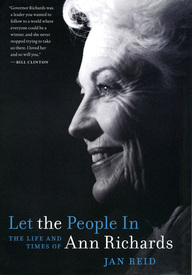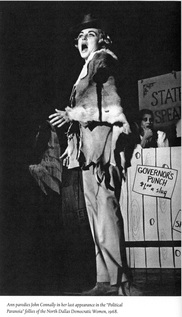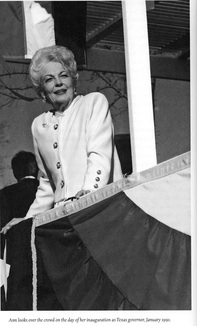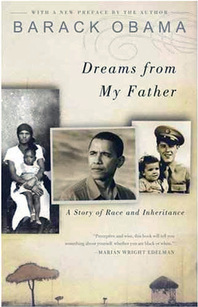By Book World


I pre-ordered this book from the University of Texas Press, so it literally came to me hot off the . . . following its release not long ago. I thought I knew pretty much everything there was to know about late governor of Texas, Ann Richards. Not true. I didn’t realize she had four grown children, not just Cecile Richards, the current president of Planned Parenthood. I didn’t know that she had become quite bored and discouraged as a mother and homemaker and entered politics in order to challenge her mind. I didn’t realize Ann had lived her last years in Manhattan. I didn’t know, following her divorce from David Richards, that she had had a long-term relationship with a male writer (not Reid).
The biography by Jan Reid, a writer-at-large for Texas Monthly with many other journalistic credits, as well as several books, is in many ways a memoir. Reid and his wife, “Darthy,” (Ann’s pronunciation of Dorothy) were close to Ann, and many parts of the book shift to first person after having established a certain objectivity in the third person. It’s little jarring at times, but it also offers a more personal view of Ann than a straight bio would have. As one can imagine, I found a number nuggets I found irresistible and share them here:
“[Ann] had a green rubber stamp that read ‘Bullshit.’ She used it often in her correspondence with Zabel. One day, she banged the stamp on a copy of a letter from a small-town district attorney who had written to a representative in support of a House bill that increased the fines in Texas for prostitution convictions: ‘The fine is still a maximum of two hundred dollars. It’s a simple matter of arithmetic to see that a prostitute only has to have eight customers in order to pay a two hundred dollar fine. She can generally do this or more in one night.’ Beside her ‘Bullshit’ stamp Ann wrote: ‘The insidious effects of inflation are felt in all segments of society. Eight tricks a night is damned hard work’” (79).

‘Nobody wanted to hear that story. Part of me had a need to say to somebody, ‘You know, that hurt.’ So this guy [therapist in Japan] provided me with an opportunity eight thousand miles away, and I could say when I was young, Mom would sometimes have these rage attacks, and boy, they scared the hell out of me.’” (119).

“Engraved on the other side of Ann’s tombstone is a graceful line that I couldn’t hear when hear when the helicopter was circling the Capitol that day of her inauguration, all those years ago: ‘Today we have a vision of a Texas where opportunity knows no race, no gender, no color—a glimpse of what can happen in government if we simply open the doors and let people in” (426).
Ann Richards’s remarkable story is heightened by the way Reid portrays the context in which it happened. You’d think now, not the nineties, would be when Ann might have attempted to open the doors of the Lone Star State’s government (if still alive), but because of the Republicans’ choke hold on the legislature and the state’s gerrymandered congressional districts that send representation to Washington, Ann Richards couldn’t get elected today any easier than the day she lost in 1994. Whether you were fond of her or not, you might like to learn more about one of the most colorful figures in Texas political history.

I didn’t know what to expect. A Harvard graduate, the editor of its esteemed Harvard Law Review, Mr. Obama should be a fine writer. He certainly has a great control of rhetorical devices in his orations. But then I was completely bowled over by this book first published in the nineties, and anyone who’s had the privilege of reading it may understand why I’m so enthusiastic. Mr. Obama’s control of the language is exceedingly good: his understated prose, his ability to sustain a narrative and delay its resolution (novel-like), his exquisite use of figurative language, the emotional tones he strikes when he needs them.
But the memoir is so much more. Considering that he writes the book before seeking elected office, one can trace a rather subtle line between his work as a community organizer (so sneered at by his opponents in 2008) and his desk in the oval office. If people should question his motives after four years of fighting for the common person, they should read this book. As a community organizer in the projects of Chicago, Mr. Obama becomes aware of the political machine that controls and diminishes the lives of poor people—those who are so consumed with life’s ordinary difficulties that they have no idea how to fight the invisible but insidious powers that keep them oppressed. Mr. Obama gives people in the projects power over the machine by enabling them to stand up to city hall when they discover there is asbestos in their apartment building. He works with churches and public schools to help people help themselves. In a way, it is how he ran both of his presidential campaigns: engaging individuals (paid and volunteer) whom he enabled to work on his behalf. He found the best and trusted them to come through for him. Politicians often do this, but Mr. Obama seems to be a natural.
Again, the memoir is so much more. The two years he lives in Indonesia under the tutelage of a stepfather from whom he learns much. The correspondence courses his mother believes he should take, rising at four-thirty in the morning so that he can catch up with the content he’s lost in the lesser schools of Indonesia. His life in Hawaii in which he could so easily become another dropout. His first two years at Occidental College. His last two years, a diploma earned from Columbia University. His grandfather Obama, a very bright man—though without formal education. His father, also intelligent, receiving a degree from Harvard. So many places along the way of his youth, Mr. Obama could have been led astray, just another unfortunate lost to the ghetto—but because of loving relatives on both sides of his family, this man discovers what he needs to know so that he can carry on with his life, fulfill what is expected of him. From his father he learns never to turn anyone away, the elder Obama doling out money to his relatives (many who do not wish to work) until he is broke. If Mr. Obama understands the plight of the masses of our country, of the world, it is because he has learned such lessons—from his father.
But the memoir is also a history of inventing a life separate from his history, his father's history. During his trip to Kenya, after his father has been killed in an automobile accident, Mr. Obama visits with many of the elders in his family. After he listens to all their stories, near the end of the book—the emotional climax—he elects to be alone in the cemetery where is father is buried in a raised grave that is sealed with ceramic tiles.
“I dropped to the ground and swept my hand across the smooth yellow tile. Oh, Father, I cried. There was no shame in your confusion. Just as there was no shame in your father’s before you. No shame in the fear, or in the fear of his father before him. There was only shame in the silence fear had produced. It was the silence that betrayed us. If it weren’t for that silence, your grandfather might have told your father that he could never escape himself, or re-create himself alone. Your father might have taught those same lessons to you. And you, the son, might have taught your father that this new world that was beckoning all of you involved more than just railroads and indoor toilets and irrigation ditches and gramophones, lifeless instruments that could be absorbed into the old ways. You might have told him that these instruments carried with them a dangerous power, that they demanded a different way of seeing the world. That this power could be absorbed only alongside a faith born out of hardship, a faith that wasn’t new, that wasn’t black or white or Christian or Muslim but that pulsed in the heart of the first African village and the first Kansas homestead—a faith in other people” (429).
Mr. Obama’s opponents underestimated his powers of persuasion in 2008, his powers to govern the last four years, the powers to wage a heroic campaign again this year. After all that this man has accomplished, and there still exists doubt about what he is capable of! Last year Mr. Obama closed a 60 Minutes interview with the words, spoken with no great effort, “I’m a pretty persistent son-of-a-gun.”
His rivals have no idea, but once again, they’d better get prepared to deal with him straight up. Any other way will ensure their defeat.

 RSS Feed
RSS Feed